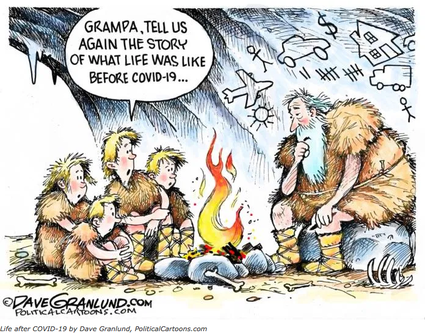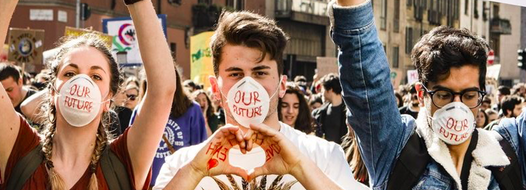
Lesson #1: Solving COVID-19 has little to do with social distancing: Politicians, doctors, scientists and literally everyone is talking about social distancing these days. However, that’s quite a misnomer. What we are seeing is physical distancing at the same time as we see social convergence. The governments that do well in this crisis are those where partisan and cross-party differences are put aside, and where leaders actually lead, by taking decisive action and communicating transparently. Families, communities and even nations are moving closer together, though mostly through virtual means. Younger community members run errands for the elderly and other people at higher risk; activists promote local buying from small enterprises to help them survive economically; we sing together on our balconies; experienced professionals are streaming their insights for free; and we give standing ovations to health workers and others at the frontline for doing their job. Stressed parents struggling to work from home while home schooling their children now appreciate the herculean task of educators. And there is another benefit of all that physical distancing: when checking in for morning meetings online we even get to see our bosses and co-workers in their pajamas, surely a bonus from a social convergence point of view! :)
Lesson #2: Global solidarity will come around. At first sight, COVID-19 seems to have pushed global solidarity down the drain. Donald Trump tried to snap up a German company with promising vaccine candidates and make it exclusively produce for the US market. Germany has been trying to limit the export of protective masks to other European countries. Just a few weeks ago, border closures or even controls all over Europe would have been unthinkable, now they are a basic fact of life. Rich countries are struggling to keep their own health systems in check, and the support they have promised to poorer countries is becoming an afterthought. But thinking again, we realise that it is the very nature of a global pandemic that it can only be fought successfully through concerted, global efforts. What good would it do for the American or any other economy to beat the virus if it could no longer let people or goods in from elsewhere in the world, for fear of re-introducing COVID-19? And we are seeing a great deal of solidarity already: Cuban doctors fly in to support the Italian healthcare system, at great risk to themselves. Europe, who sent scientists to help fight the virus in China early in the year, is now receiving more of this kind of support in return. Border checks to keep the virus at bay may well be the last measure to be lifted, but they will not last forever.
Lesson #3: Their socio-economic contributions now will define companies for years to come: we have been talking about the ‘triple bottom line’ for decades, about the reconciliation of people, planets and profits, asking companies to account not only for finances but for their social and environmental impacts as well. While the success of this is debatable as pointed out by John Elkington himself (the man who coined the term 25 years ago) the crucial socio-economic role companies play and which is sometimes forgotten in sustainability debates, is brought to the fore by the COVID-19 response. Those companies that do not dismiss their employees right away play an important role in preventing even bigger damage due to unemployment. Those who shift their production of arguably less socially desirable goods, such as fast fashion or perfumes, to producing the stuff we really need right now, such as disinfectant, masks or other protective equipment, lead the way. We keep hearing about fascinating innovations, such as 3D-printing of respirators. It is these companies - going back to basics and trying to serve people what they really need - that will be fit for the future.
Lesson #4: There will be winners and losers. We are moved by, and publically applaud, the dedication not only of our health workers. We also celebrate the people working at the front line in supermarkets and pharmacies, and those keeping our utilities and public TV stations running - basically by moving into their offices and giving up real life for a couple of weeks - to avoid service disruptions for all of us. We beg pharma companies to come up with diagnostics, vaccines and medicine. And as we are leapfrogging into digital forms of work, education and service provision, we thank telecommunications companies for ensuring broadband continuously lives up to its promises. Arguably, many of the industries and companies who provide the goods and services considered essential right now (think pharma, medtech, IT, telecoms, etc.) will benefit economically in the longer run. And that is exactly the point of triple bottom line thinking.
Lesson #5: Systems change is becoming a realistic prospect - if we want it. Humankind has overcome many enormous challenges in the past. There is no reason why we would not be able to bring this one behind us as well. Recent reports from China, the origin of the pandemic, as well as other Asian countries that have been successful in containing the spread of the virus, such as South Korea, are encouraging. However, whether we manage to use our newly derived insights for broader systems change towards a more sustainable and socially just economy remains to be seen. The main ingredient for systems change - a strong external push - is there and the opportunities are clear: as governments bail out failing enterprises, for example in the travel industry, they must impose conditions that will help them reach their environmental targets. Investors have plentiful alternative to fossil fuels these days, and they would be well advised to use them.
Lesson #6: Getting our priorities right. If nothing else, COVID-19 has been a timely reminder about the paramount importance of health and wellbeing. Some of us have rediscovered the little (and in some places guilty) pleasure of going for a walk in the park. We realise we can do without constant business travel or shopping trips abroad, and that cooking at home is a viable option vis-à-vis taking out fast food or eating in restaurants. And we may just begin to realise that taking climate action sooner rather than later is the only option to prevent the next health crisis.
Lesson #7: COVID-19 is not a health issue. COVID-19 is not just a disease. It is not just a health issue the solution of which depends on doctors, nurses, medicines and other parts of a functioning health system. It is also an economic issue, an environmental issue, a social issue, a communication issue, a business issue, a scientific issue and many other issues at the same time. The exact same is true for climate change by the way.
Whether or not we will manage to harness the tragic opportunity offered by COVID-19 will depend on all of us. Let’s #stayathome and do it.
And there is another benefit of all that physical distancing: when checking in for morning meetings online we even get to see our bosses and co-workers in their pajamas, surely a bonus from a social convergence point of view!


 RSS Feed
RSS Feed